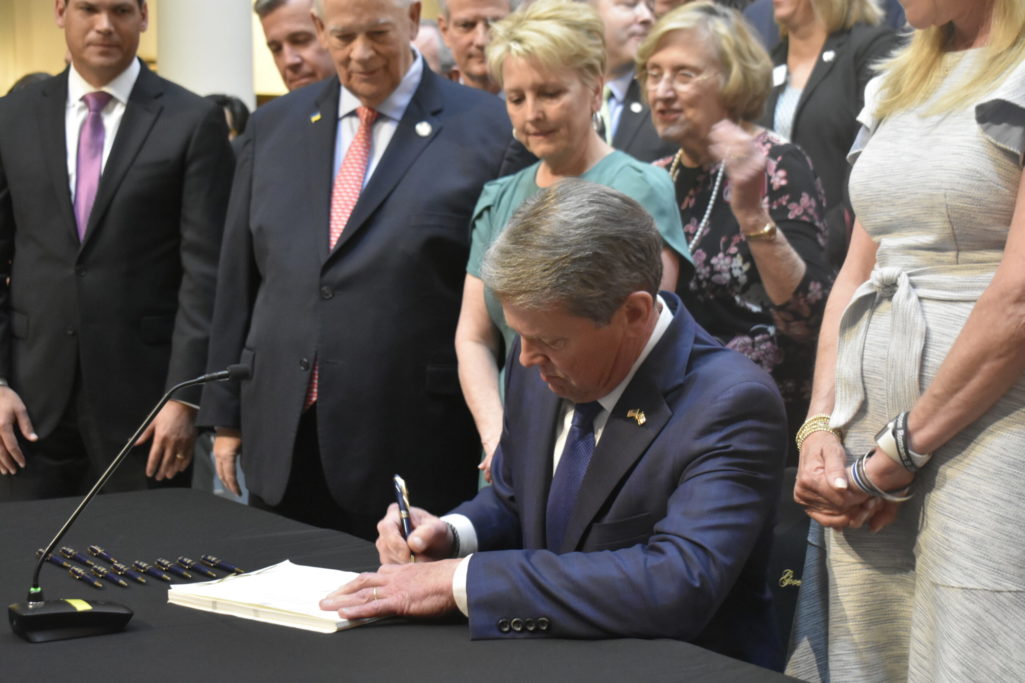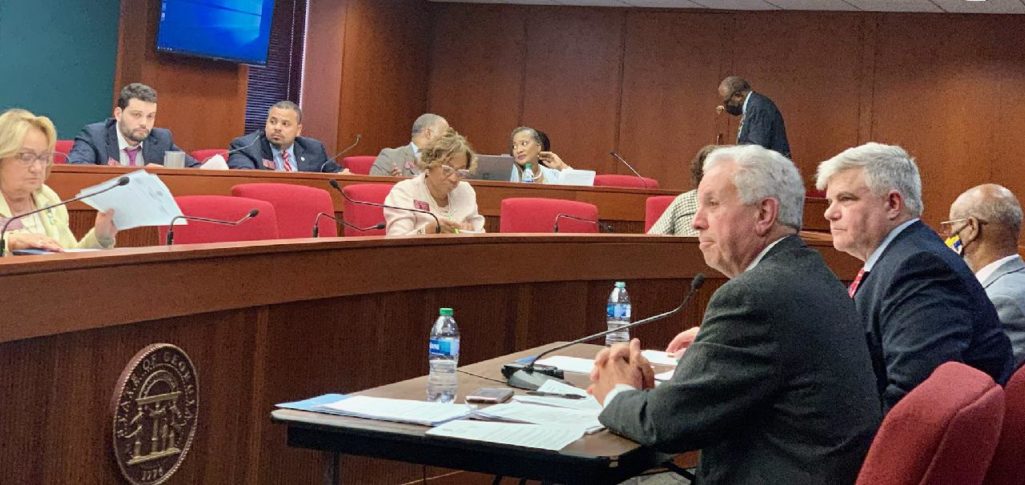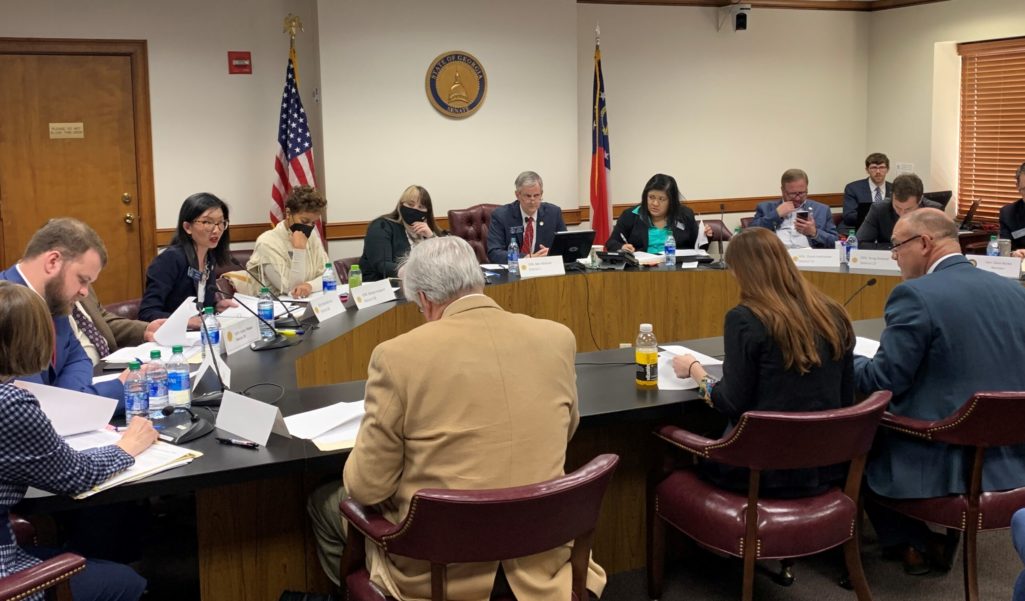
(GA Recorder) — This year’s legislative session was packed with headliner bills like the speaker’s mental health reform bill and plenty of homages to the culture wars brewing on the GOP home front.
Many of those bills now sit on the governor’s desk, kicking off a month-long signing period. Some of them eked it out in the final hours, such as a so-called “election police” bill and a proposal that could lead to a ban on transgender athletes from playing on girls’ high school sports teams.
But there were also several closely watched measures that sputtered out on the final day Monday, such as a ban on mail-order abortion medication that was on the move in the past week. Some bills, like a controversial crackdown on protesters, fizzled in the lead-up to Monday’s session finale.
Here’s the Georgia Recorder staff’s rundown on the notable bills that failed in the end and will need to start from scratch to be revived in future legislative sessions.

Medical cannabis
More than 20,000 Georgians who were hoping the legislature would kick start the state’s stalled medical cannabis program lost their chance for the year Monday after the Senate failed to approve a last-minute compromise.
“I’m at a loss on that,” House Speaker David Ralston told reporters. “How long are these people going to have to wait? I’m really, really disappointed. We worked, we couldn’t get the Senate to engage very much on the conference committee. We thought we had them engaged, they came back with a conference committee report, and they put it up and it gets beat. I hope the families of Georgia know that we gave it our best shot. The blame is over there, as far as I’m concerned.”
In 2015, the state legalized a form of low-THC oil for a list of specific medical conditions. Georgia’s law does not allow for smokable marijuana, only a specialty substance that contains a very small amount of the chemical that causes marijuana’s high, and only for people with serious conditions including seizure disorders, Alzheimer’s disease, Parkinson’s disease and cancer.
But legal threats and accusations of inside deals have stalled the state’s in-state cultivation program and forced patients to continue to leave the state or skirt the law to buy medicine they are legally able to possess but not buy in Georgia.
Relief appeared to be in sight as a committee including members of the two chambers formed a compromise designed to get the oil into the hands of patients and families.
Under the compromise deal, the state would have reopened the process for three more facilities in addition to the original six that were granted preliminary approval. The 63 companies that originally applied but were not approved would have been eligible and exempt from paying the application fee again, provided they withdrew from protests or lawsuits against the state.
The House agreed to the measure 95-73 Monday night.
“We’ve finally come up with a plan that is fair to all concerned,” said House Majority Leader Jon Burns, a Newington Republican. “This addresses a need, a desperate need for the citizens of our state to utilize this product that makes a huge difference in the health of the people of this state.”
The Senate was less happy with the terms of the arrangement. Senate Minority Leader Gloria Butler, a Stone Mountain Democrat, moved to table the legislation, preventing it from coming to a vote. Her motion passed 28-27, despite pleas from the bill’s sponsor in the Senate, Savannah Republican Sen. Ben Watson.
“We’ve been working on this for 10 years, we have not gotten this oil to the children that they deserve,” Watson said. “That is what the children of the state of Georgia and all those registrants deserve, getting that oil to them.”
Gambling
An expansion of Georgia’s legal gambling options was not in the cards for the 2022 legislative session despite efforts from powerful lawmakers.

A push to legalize betting on horse races faltered as the session entered its final stretch, but bills to allow referenda on sports betting and potentially other forms of wagering appeared to defy the odds, passing the House Economic Development and Tourism Committee and raising hopes it could receive a House vote.
Supporters said allowing more forms of wagering would bring new revenue to the HOPE Scholarship program and allow for some needs-based scholarships for students who are accepted into college but do not meet HOPE’s academic requirements. Opponents said growing the gambling industry beyond the Georgia Lottery would only invite addiction and other social ills.
Savannah Republican Rep. Ron Stephens sought to minimize those concerns Monday with a bill stripped of everything other than the sports betting aspect.
“Like the other 33 states that do this, you do have to register, they have to guarantee that you are 21 or over, and then they cannot use a charge account,” he said. “Unlike the ones that are overseas (that) can run up a debt, this is strictly a cash deal. And it’s an app on your phone. I’ve got it on mine. And it’ll be essentially the same people that are contracting with the state, the state will take 20 percent of every bet that you make, and it goes to fund HOPE and pre-K and opportunity fund. Education, all education.”
But the bill failed to pass the House Rules Committee Monday, dooming its chances of receiving a full vote.
Gambling expansion is a perennial topic for debate in the Georgia Legislature, but passage is difficult because Georgia’s constitution specifically forbids gambling with very few exceptions, meaning any action to grow the industry would require a two-thirds vote in both chambers rather than a simple majority.
Abortion
A proposal to make it harder for women to access abortion medication stalled in the House Monday.
The bill, which cleared the Senate last month with a party-line vote, would have required women to have an in-person exam – along with an ultrasound – before being prescribed medication like mifepristone. It would have also banned the drugs from being distributed on college campuses or sent by mail.
The GOP proposal was voted out of committee Friday but was delayed by an attempt to merge it with another controversial proposal requiring hospitals and nursing homes to allow one-hour of visitation during a health emergency.

The abortion measure is a response to the Biden administration’s pandemic-loosened rules that allow for mail-order medication abortion and eased access to the drugs as more women turn to telemedicine for care. The Food and Drug Administration made the change permanent in December.
Supporters framed the issue as a safety concern and pushed to require an in-person exam, but opponents argued Republican lawmakers were trying to needlessly create barriers for a woman who wishes to end her pregnancy.
Rep. Katie Dempsey, a Rome Republican who sponsored the bill in the House, objected to the patient visitation bill being added and was against a proposed rebranding of the bill from the “Women’s Health and Safety Act” to the “In-person Access to Care Act.”
“We’re dealing with a very important issue – an issue much more focused on maternal health than on patient visitation, and I really think it will kill it,” Dempsey told her colleagues in the House Rules Committee.
The original proposal later advanced out of the calendar-setting committee, only for it never to be called up for a vote. House Speaker David Ralston, a Blue Ridge Republican, blamed it partly on the clock.
“You can’t get to everything,” Ralston told reporters. “Sometimes I respond to setting the calendar based on the level of interest that’s out there, and there didn’t seem to be a lot. So, we have to prioritize near the end, and I think that we did that in a fair way.”
Ralston had also said early in the session, when asked generally about potential new abortion restrictions, that he wanted to await the U.S. Supreme Court’s ruling on a Mississippi abortion case. Georgia’s strict 2019 anti-abortion law is on hold pending the outcome.
Cash bail
This year’s session also ended Monday without the full House voting on a bill requiring anyone arrested for a felony to post cash bail before they could be released from jail.
Criminal justice reform advocates and Democratic lawmakers celebrated the demise of Senate Bill 504, which could have forced thousands more people to remain locked up due to their inability to pay cash or post property as collateral.
Sen. Randy Robertson, a former police officer, argued his bill encouraged people to stay out of trouble and show up in court by putting something at risk. The Cataula Republican said judges were becoming too lenient by letting people out on a signature promise that they would appear in court, only for them to commit other crimes while out of jail.
In 2020 and 2021, laws were passed removing cashless bail for violent felons and felony charges for burglary, stalking and entering an automobile.
Senate Bill 504 passed on party-line votes in the Senate and in a House public safety panel, but Robertson’s push to add hundreds more offenses failed to cross the legislative finish line.







